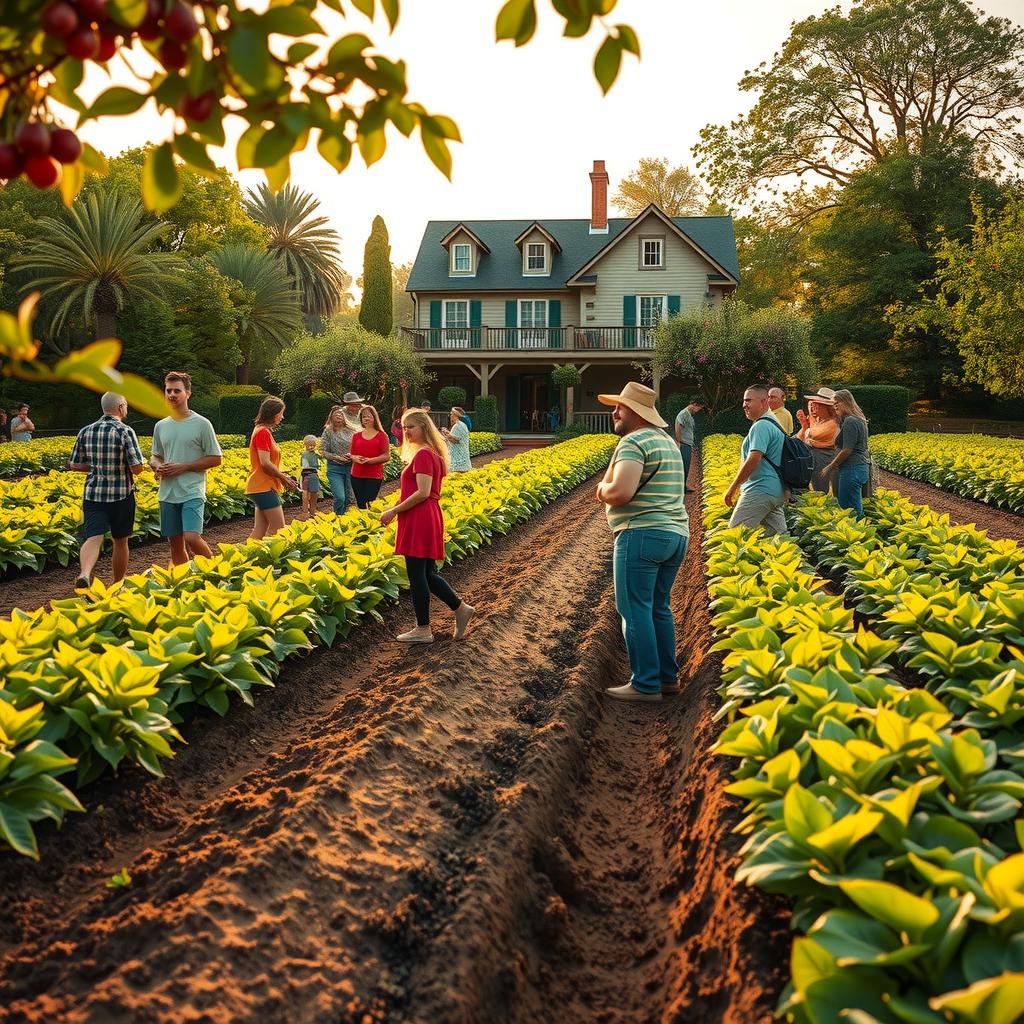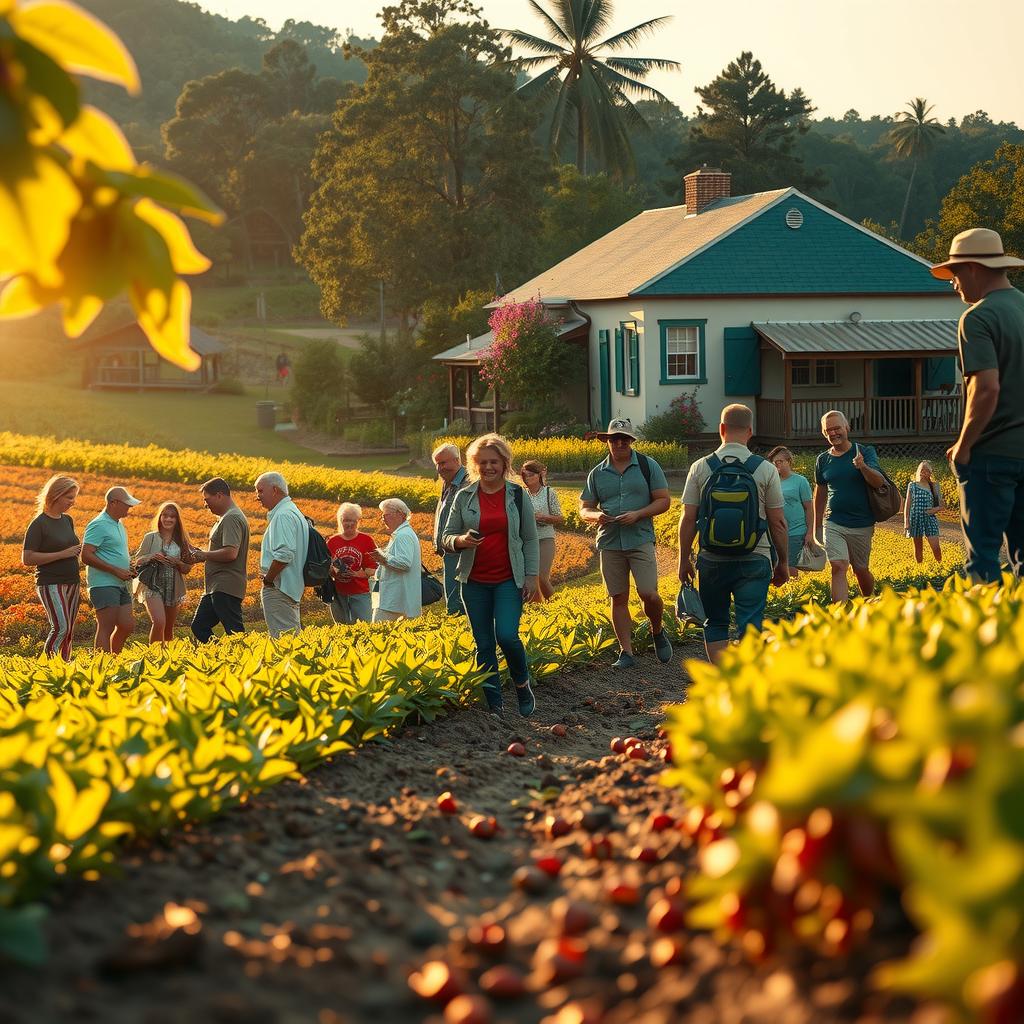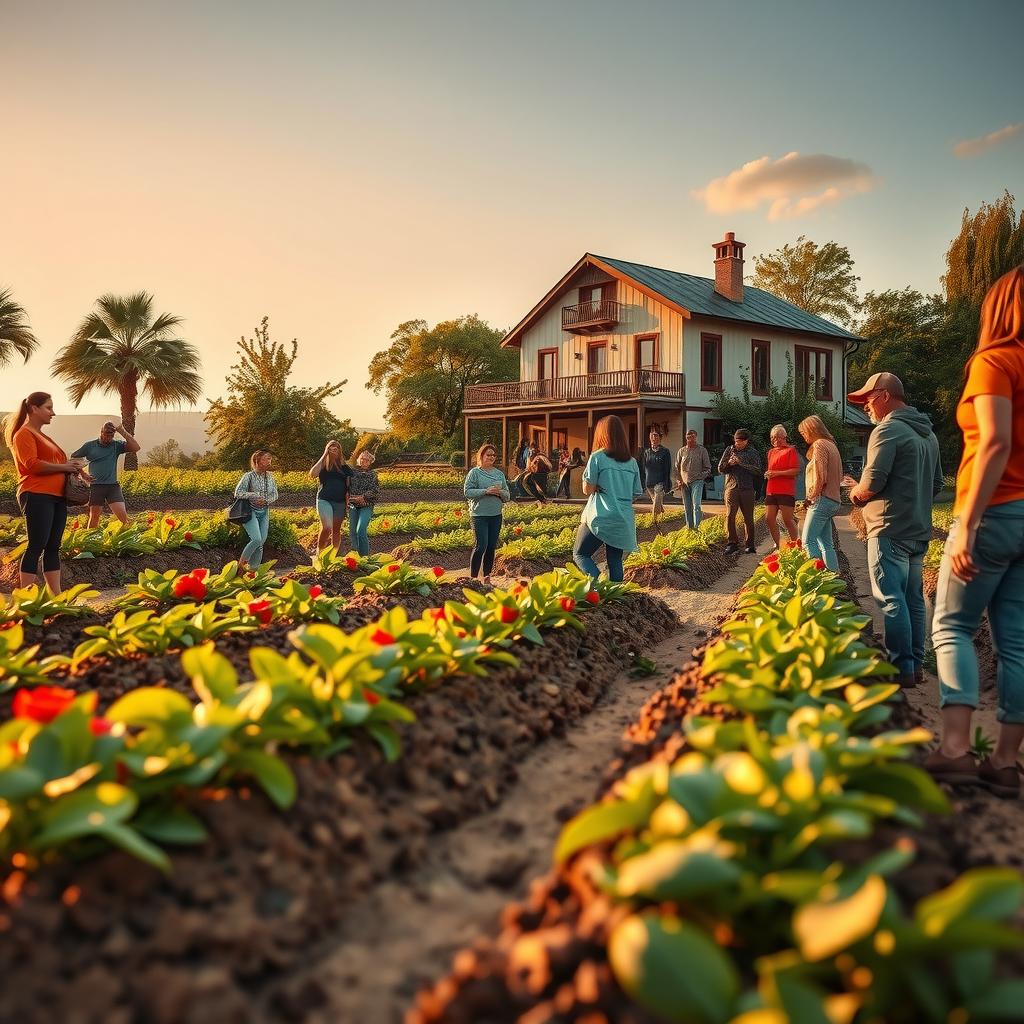In an age where travelers increasingly seek authentic and meaningful experiences, Agritourism has emerged as a compelling way to connect individuals with the roots of their food and local cultures. This trend not only allows visitors to explore stunning rural landscapes but also provides an avenue for engaging directly with sustainable farming practices that are vital for the health of both the planet and local economies. As communities embrace agritourism, they foster a deeper understanding of how food is produced while simultaneously promoting sustainable agriculture support that benefits farmers and consumers alike. Travelers can immerse themselves in unique opportunities—from picking seasonal fruits to participating in hands-on workshops—transforming their vacations into educational journeys filled with rich experiences.
The rise of agritourism is closely tied to its ability to enhance rural development, creating new economic avenues for farming families who might otherwise struggle against urbanization pressures. By welcoming guests, these farms provide essential income streams that bolster local economies while preserving traditional agricultural methods. Many popular destinations have begun integrating agritourist activities into their offerings, showcasing everything from organic vineyards in California’s Napa Valley to lavender fields in Provence, France. Each destination highlights distinct regional practices and showcases how sustainable farming practices contribute not only to environmental health but also to cultural heritage.
For travelers seeking unique vacation planning tips, agritourism presents a wealth of options that cater specifically to those wishing to experience life on the farm firsthand. Engaging with farmers through immersive tours or enjoying farm-to-table meals crafted from ingredients harvested just hours before provides unparalleled insight into food systems often taken for granted. These authentic encounters offer more than mere leisure; they educate tourists about responsible consumption behaviors while supporting small-scale producers committed to sustainability.
Furthermore, as awareness grows surrounding climate change and its impact on our environment, many are turning toward agritourism as a means of making informed choices about what they eat and where it comes from. Establishments involved in this movement prioritize eco-friendly practices such as crop rotation, biodiversity conservation, and reduced chemical use—principles at the heart of sustainable agriculture support. This alignment between traveler interests and farmer initiatives creates mutually beneficial relationships that pave the way for future generations.
As this blog post delves deeper into various aspects surrounding agritourism, readers will discover its multifaceted benefits: enhancing community ties through shared knowledge about sustainable methodologies; fostering respect for natural resources; enriching personal travel narratives through direct engagement with land stewards; all culminating in memorable agritourism experiences designed not just for enjoyment but active participation toward positive change.

Key Points:
-
Definition of Agritourism: Agritourism encompasses a variety of activities that allow travelers to experience agritourism firsthand, often on working farms. This can include farm stays, vineyard tours, fruit-picking experiences, and educational workshops about sustainable farming practices. Each form offers unique interactions between visitors and the agricultural environment, fostering an appreciation for rural life.
-
Advantages for Stakeholders: The benefits for farmers, travelers, and local economies are profound within the realm of agritourism. Farmers gain additional income streams while sharing their knowledge of agriculture with guests. Travelers benefit from immersive experiences in nature that enhance their understanding of food production and sustainability. Additionally, local economies thrive from increased tourism revenue as visitors support nearby businesses such as restaurants and shops.
-
Support for Sustainability: Engaging in agritourism experiences promotes sustainable agriculture support by encouraging responsible farming methods that protect the environment while enhancing rural development. Through these initiatives, tourists discover how their choices impact local ecosystems and communities. Popular destinations worldwide showcase successful models where agritourists participate in organic farming practices or learn about community-supported agriculture (CSA), creating a direct link between travel enjoyment and conscientious consumer behavior.

Defining Agritourism: A Multifaceted Experience
The Essence of Agritourism in Contemporary Travel
Agritourism represents a unique intersection of agriculture and tourism, offering travelers the opportunity to immerse themselves in rural life while supporting local economies. This innovative concept encompasses various activities that allow visitors to engage with farming practices, from picking fruits at a local orchard to participating in farm tours or cooking classes featuring locally sourced ingredients. As modern travelers increasingly seek authentic experiences, agritourism has gained traction as an appealing option for those wishing to explore sustainable farming practices and learn about food production firsthand. With its roots deeply embedded in community-based initiatives, agritourism not only provides educational opportunities but also fosters rural development by creating jobs and promoting regional culture. Popular destinations for agritourism experiences often include vineyards, farms, and ranches where tourists can enjoy hands-on activities such as wine tasting or animal husbandry workshops.
The Significance of Agritourism
Connecting Travelers with Sustainable Practices
The significance of agritourism extends beyond mere recreational value; it plays a crucial role in advocating for sustainable agriculture support and fostering environmental awareness among consumers. By engaging with farmers directly, travelers gain insights into agricultural practices that prioritize ecological balance and biodiversity conservation. This direct interaction encourages appreciation for local produce while highlighting the challenges faced by farmers today due to climate change and market fluctuations. Furthermore, participating in agritourism experiences, such as harvest festivals or farm-to-table dining events, allows individuals to understand the journey their food takes before reaching their plates—thereby cultivating a sense of responsibility towards sustainable consumption patterns.
Moreover, the economic benefits derived from agritourism are substantial; they help strengthen local economies through increased visitation rates during peak seasons which boosts business for nearby restaurants, shops, and lodging facilities. Such growth often leads communities toward enhanced infrastructure investments aimed at accommodating tourist needs without compromising the integrity of rural lifestyles—an essential consideration when planning vacation itineraries centered around agrarian themes.
As more people incorporate these facets into their travel plans—whether seeking relaxation amidst nature or pursuing educational adventures—the importance placed on supporting locales practicing sustainable farming will likely continue rising within global tourism trends.

The Empowering Impact of Agritourism
Bridging Farmers and Travelers for Mutual Growth
The landscape of modern travel has evolved, with agritourism emerging as a powerful catalyst for change. This innovative approach not only enriches the experiences of travelers but also offers significant advantages to farmers and local communities. By connecting consumers directly with agricultural producers, agritourism fosters an appreciation for sustainable farming practices while providing a unique opportunity for visitors to engage in rural development initiatives. For many travelers seeking authentic experiences, visiting farms or participating in harvest activities presents a chance to learn about food production firsthand—transformative encounters that deepen their understanding of where their food comes from.
Moreover, the benefits extend far beyond mere enjoyment; they play a vital role in boosting local economies. As tourists flock to popular destinations that promote agritourism, they contribute financially through spending on accommodations, meals, and various agritainment activities. Farmers can diversify their income streams by offering tours, workshops, and farm-to-table dining experiences—all integral components of successful agritourism ventures. As highlighted by industry experts: “When visitors spend time on farms, they become advocates for sustainable agriculture support,” which is crucial for both environmental stewardship and economic resilience within rural communities.
Additionally, agritourism serves as an educational platform that promotes sustainable agriculture practices among both producers and consumers alike. Many farms are now incorporating eco-friendly methods into their operations while welcoming guests who seek knowledge about organic farming techniques or conservation efforts aimed at protecting natural resources. Such interactions empower travelers with actionable insights on how they can contribute positively to sustainability efforts back home.
For those planning vacations centered around these enriching experiences—known as vacation planning tips—consider exploring regions renowned for their commitment to agro-based tourism offerings. From vineyards producing exquisite wines to orchards bursting with seasonal fruits ready for picking, each destination provides its own unique set of opportunities rooted deeply in community engagement and agricultural heritage.
In conclusion, the interplay between farmers’ needs and traveler interests creates a harmonious synergy through agritourism that advances economic stability while fostering environmental stewardship across rural landscapes worldwide. Visitors walk away enriched not only by the beauty surrounding them but also by newfound respect towards those dedicated individuals working tirelessly behind the scenes—their stories woven intricately into every bite savored during such extraordinary trips grounded firmly in culture-rich settings influenced largely by this dynamic sector’s growth trajectory.
Understanding Agritourism’s Role in Sustainable Agriculture
Bridging the Gap Between Farming and Tourism
Agritourism emerges as a vital intersection of agriculture and tourism, fostering an environment where sustainable farming practices can thrive while simultaneously supporting rural development. The concept revolves around inviting visitors to engage with the agricultural landscape, offering them firsthand experiences that highlight local produce, culinary delights, and traditional farming methods. This not only boosts local economies, but also encourages farmers to adopt more sustainable approaches by creating a direct connection between consumers and producers. Through activities like farm tours, harvest festivals, or workshops on organic gardening techniques, agritourism cultivates awareness about the importance of sustainable agriculture support, leading travelers to appreciate the labor-intensive processes behind their food sources.
The benefits are multi-faceted; on one hand, agripreneurs gain additional income streams through visitor fees or product sales directly from their farms. On the other hand, tourists receive enriching experiences that enhance their understanding of food systems and promote healthier dietary choices—aligning perfectly with today’s trends towards sustainability. Popular destinations for agritourism often showcase diverse offerings such as fruit picking in orchards or learning about regenerative farming techniques at educational farms. These engagements not only elevate visitors’ vacation experiences but also solidify community ties by involving local artisans and businesses in this economic model.
Economic Benefits: A Catalyst for Rural Growth
How Agritourism Stimulates Local Economies
Incorporating agritourism into rural areas serves as a catalyst for economic revitalization by generating additional revenue streams for farmers while diversifying local economies beyond traditional agricultural outputs. By hosting guests who partake in unique agrarian activities—from wine tasting at vineyards to participating in hands-on cheese-making classes—farmers can significantly increase profit margins without overextending resources allocated solely towards crop production or livestock management. Furthermore, this infusion of tourist dollars helps sustain small businesses like bed-and-breakfast establishments and artisanal shops that cater specifically to visitors seeking genuine cultural interactions during their stay.
Moreover, rural communities benefit from job creation linked with agritourism ventures—positions ranging from tour guides knowledgeable about regional history to hospitality staff dedicated to ensuring visitor satisfaction create vibrant employment opportunities within these areas. With increased foot traffic comes heightened visibility for these regions; thus attracting new entrepreneurs eager to invest based on successful models established by existing agribusinesses engaging in these practices creates symbiotic relationships essential for long-term viability within smaller markets.
Enhancing Traveler Experiences Through Agritourism
Exploring Unique Offerings that Promote Sustainability
Travelers increasingly seek authenticity when planning vacations; therefore agritourism resonates deeply with those desiring immersive experiences tied closely with sustainability efforts found at destination locales worldwide. Engaging actively alongside farmers allows guests insight into daily routines shaped around environmentally conscious methodologies employed across various crops—from permaculture gardens flourishing under natural ecosystems’ guidance—to innovative pest control measures utilizing beneficial insects instead of harmful chemicals disrupting delicate balances inherent within nature itself.
Visitors gain knowledge regarding how individual choices impact broader environmental concerns—a critical realization stemming from participation in hands-on workshops taught directly by passionate individuals vested heavily into preserving both land integrity along generations past while cultivating future growth potential through education initiatives targeting youth involvement within agriculture sectors alike! Consequently promoting healthy lifestyles among attendees enhances overall wellness outcomes reflective upon returning home post-travel experience rich with newfound appreciation toward responsible consumption patterns shaping future market demands favorably aligned alongside principles underpinning sustainable farming practices resonating throughout contemporary society today!
Agritourism encompasses a variety of activities that allow travelers to engage with farming and rural life directly. This form of tourism can include farm stays, tours, workshops, and on-farm events where visitors can experience sustainable farming practices first-hand. By participating in Agritourism, travelers gain insight into the agricultural process and learn about local food systems while enjoying unique experiences that are often unavailable in traditional tourist destinations.
The benefits for farmers involved in Agritourism extend beyond just additional income; it helps to diversify their revenue streams while promoting sustainable agriculture support. Travelers also benefit by gaining authentic experiences that foster a connection with nature and local communities. Moreover, agritourism plays a significant role in strengthening local economies by attracting visitors who spend money on food, lodging, and regional products. This exchange not only aids individual farms but contributes to broader rural development initiatives.
When considering popular destinations for Agritourism, regions such as Tuscany in Italy or Napa Valley in California stand out for their renowned wine tours and farm-to-table dining experiences. Additionally, many small-scale farms worldwide offer immersive programs where guests can participate in seasonal harvests or learn about animal husbandry through hands-on workshops. For those planning an agritourism vacation, tips include researching various agritourism experiences available at different locations, understanding the sustainability initiatives of each farm visited, and being open to learning from the local culture.
Common Inquiries:
Q: What is agritourism?
A: Agritourism refers to any activity that brings visitors onto farms or ranches for recreational purposes while allowing them to engage with agriculture firsthand.
Q: How does agritourism benefit local economies?
A: Agritourism stimulates local economies by increasing spending on goods and services offered by nearby businesses while creating new job opportunities within rural areas.
Q: What should I consider when planning an agritourism vacation?
A: When planning an agritourism vacation, it’s important to research potential destinations thoroughly, check reviews of specific farms or attractions focused on sustainable farming practices, ensure availability during peak seasons like harvest time, and look for educational programs that align with personal interests.
